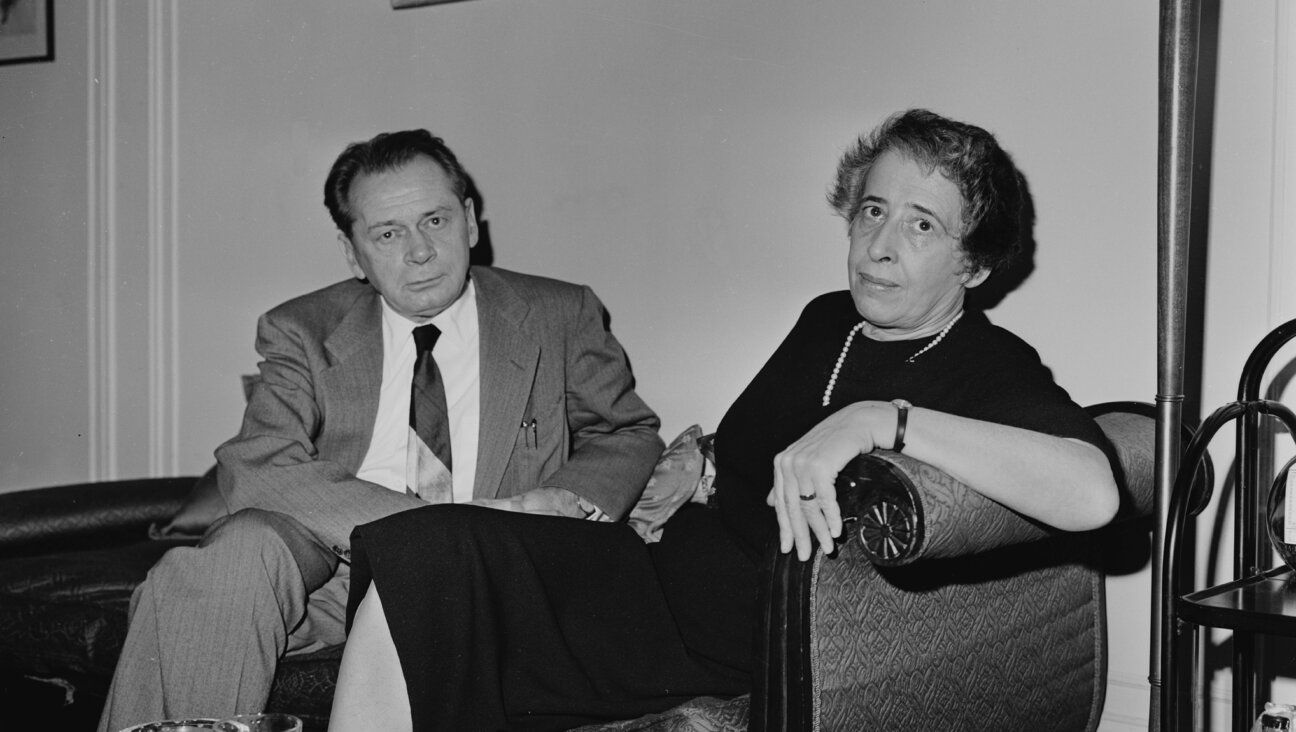In a new war over Middle Eastern food, eating hummus and shawarma has become a political act
For some, calling a chopped salad ‘Israeli’ or ‘Palestinian’ says a lot about where you stand on the Israel-Hamas war
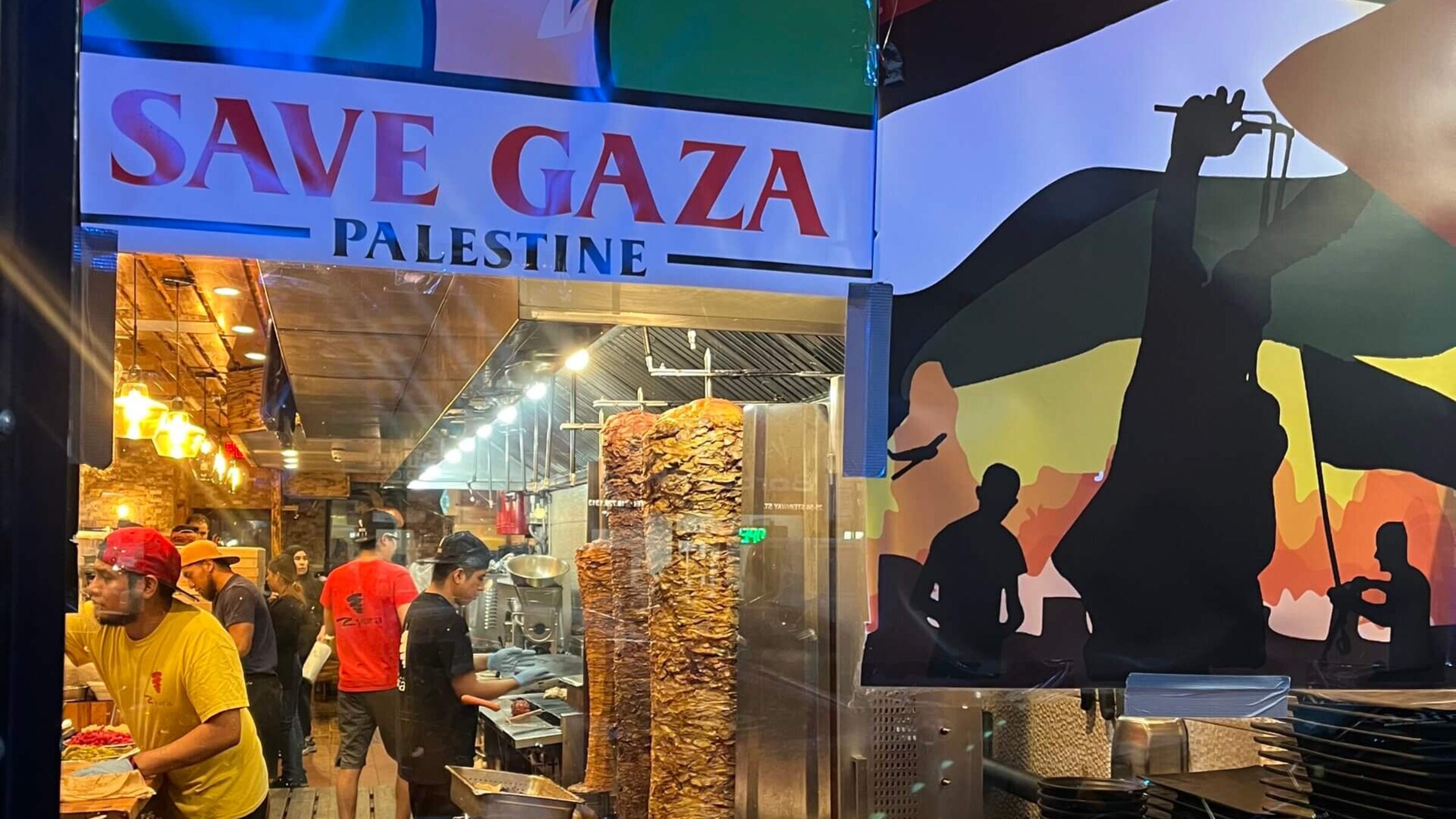
Zyara is a no-frills Palestinian restaurant on Steinway Street, an Arab strip in the Queens neighborhood of Astoria. Photo by Andrew Silverstein
Even though it was only 5 p.m. on a weekday night, there was already a line at Zyara, a no-frills Palestinian restaurant on Steinway Street, an Arab strip in the Queens neighborhood of Astoria. In addition to the Arabic-speaking regulars, there were newcomers with Gaza on their minds.
“With the amount of hate and wrong things people are doing, it’s good to show some love and care,“ said Aram, a 30-year-old Pakistani-American school teacher. Nearby, a table of college students dipped pita chips into a garlic sauce, and a taxi driver ordered to go, planning to eat his platter from behind the steering wheel. The day before, videos of a man harassing an Egyptian food vendor on the Upper East Side had gone viral. Aram and a friend had driven in from Nassau County to eat at a Palestinian restaurant. Zyara, with its “Save Gaza” posters in the window and freshly baked pita, was a natural choice.
A wood panel opposite the counter was full of messages for Gaza written in English and Arabic. Beside it was a collection box for Palestinian charities. But even without leaving a donation or scrawling out a message, Aram felt that just ordering a shawarma platter was a way to fight Islamophobia and show support for Palestine. “I think as a community we need to stand together and united,” she said.
In a conflict fueled by competing nationalist claims, food has become a powerful symbol. In recent years, Israeli chefs have won awards and Michelin stars in Europe and the United States. The vegetable-forward cuisine flavored with local spices illustrates Israeli Jews’ connection to the land. But for centuries, pita, hummus, shawarma, and falafel have been eaten across the Levant: in Syria, Lebanon, Jordan, and Palestine. The perception that Israel claims and profits from traditional Arab food raises accusations of culinary colonization. Palestinian chefs, in turn, use their recipes to resist this perceived cultural erasure.
A history of war over food
Silvan Baron, the Israeli owner of the Harlem Middle Eastern café and shop Silvana, constantly sees messages about rocket sirens back in Israel in her family’s WhatsApp group. In Astoria, Queens, Fares Zeideia, the Palestinian owner of the King of Falafel and Shawarma, talks with his family back in the West Bank, where armed settlers march through his village at night. “They chant, ‘Death to Arabs,’” he told me against the backdrop of his red, green and black dining room.
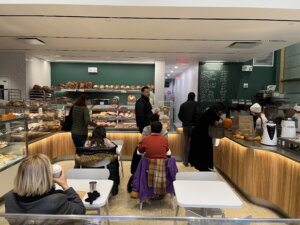
Since Oct. 7, Israeli and Palestinian-run restaurants have become both gathering points for community members to vent and grieve over bowls of hummus, as well as targets for activists. Just this past weekend, a large group of protesters gathered in front of Israeli-American chef Michael Solomonov’s Philadelphia restaurant Goldie, lobbing accusations of genocide. Arab food workers have been harassed. Palestinian restaurants have been bombarded with negative reviews, and there are calls to boycott Israeli establishments. In turn, supporters have shown up, placing orders and tipping extra.
Last week, the woman in front of me in line at the Union Square Bread’s Bakery held her chocolate babka up and proclaimed that she had come to support the Israeli-owned bakery after its Rockefeller Center location was vandalized during a pro-Palestine rally.
New Yorkers have long shown wartime solidarity by dining out. When Russia invaded Ukraine, pierogis and borscht became popular Manhattan brunch items. In 1967, the Israeli club and restaurant El Avram opened just one week before the Arab-Israeli Six-Day War. “When Jerusalem was conquered, my place became the hit of New York,” owner Avram Grobard said in a 2020 online interview. “I had a line around the block. People begged to come in.”
But in 1967, Israel was seen by most Americans as a David versus Goliath facing down the armies of three larger Arab nations. On Oct. 7, Israel suffered a horrific massacre, but its military is now perceived by many as a Goliath, which has occupied Palestinian territories for decades. The Israel-Hamas war has divided Americans. A recent Gallup poll found exactly half of Americans support Israel’s actions in Gaza. Meanwhile, Middle Eastern food, once niche, has become trendy and often identified with Israel, which has promoted hummus and falafel in international food expos as Israeli cuisine since the 1950s.
Sabra, an Israeli company partially owned by Pepsi, sells packaged hummus in nearly every supermarket. Bon Appétit named the celebrity chef Solomonov’s hummus the “2015 dish of the year.” There are hip new Israeli restaurants in New York, Philadelphia, LA, Madrid, Berlin and Paris.
Palestinian chefs have had a rougher path. The New York Times reported that editors hesitated to publish Joudie Kallan’s 2016 cookbook Palestine on a Plate, fearing the name was too provocative. In a 2011 episode of the sitcom Curb Your Enthusiasm, dining in a Palestinian Chicken restaurant was portrayed as transgressive. When Larry David and his friend visit the fictional LA restaurant “Al-Abbas,” they see a “Freedom for Palestine” poster and conclude that the owner and patrons are antisemites. While David is a master of hyperbole, the episode highlights the fact that many Americans feel threatened by Palestinian nationalism and, by extension, their food.
Israeli salad or Palestinian salad?
Fares Zeideia, a boisterous man who stands over 6 feet tall and continually paused our conversation to offer customers free falafel, recalled opening his first cart in Astoria a few months after 9/11. “People passed by and started calling, ‘You’re a terrorist. Go back. You don’t belong here,” said Zeideial. “I’d say I’m from Palestine, and they’d say, ‘There is no Palestine.’”
Zeideia spent two years working on the recipes for his oblong-shaped falafel and shawarma platters with pickled vegetables and tahini sauce. He wanted the spicing and texture to match the food of Ramallah — something, he said, not found in New York at the time. “I wanted that flavor that I was brought up with and for the dignity of Palestinians,” he said.

In 2010, the King of Falafel and Shawarma won the “Vendy Award,” given to the best food cart in New York City. Six years later, Zeideia, whom his customers call Freddy or King, opened a sit-down restaurant. He also has four carts in Queens, Manhattan, and the Bronx.
The restaurant façade simulates the front of a food truck, including working headlights. Above it hang the American and Palestinian flags. A mural of an Astoria street scene fills one wall. The other walls represent Palestine with images of the Al-Aqsa mosque, Arab folk art, pre-partition maps, and photos, including still images of Anthony Bourdain in Gaza from a 2013 Parts Unknown episode. “He talked about how the Palestinians are suffering,” said Zeideia.
While Bourdain is honored on the wall, photos of politicians line the floor. In 2021, Zeideia placed headshots of the Saudi Crown Prince Mohammed bin Salman and United Arab Emirates ruler Mohamed bin Zayed for customers to step on. “They caused all the trouble, from Yemen to all the wars in the Middle East,” he said. A pro-Saudi TikTok account publicized the decals, which led to 40,000 one-star Google reviews overnight and threatening phone calls. Some chastised Zeideia for posting a pride flag on his social media.
In response, Zeideia put more photos of Saudi leaders and later Israeli politicians like Benjamin Netanyahu, Palestinian Authority leader Mahmoud Abbas, and Egyptian President Abdel Fattah El-Sisi. The latest additions to his walk of shame are Joe Biden and U.K. Prime Minister Rishi Sunak for their support of Israel’s siege. Since the failure of the Oslo peace process, he said, he has lost faith in politicians.
But Zeideia communicates most strongly through his food, which he uses to push back on what he sees as Israeli appropriation of Palestinian culture. “They robbed it. That’s why I have a Palestinian salad,” Zeideia said. When customers call the chopped tomato and cucumber “Israeli Salad,” he corrects them: “You got to say, ‘I want the Palestinian salad,’ and I’ll give it to you.”
Though some have argued that hummus was the food of biblical Jews or that the Jews of Damascus ate the same chopped salad and falafel as their Muslim and Christian neighbors, many Israeli food scholars and chefs agree that Israelis adopted foods like hummus from Palestinians.
“Israeli cuisine grew from traditions that were brought here, and were also born here,” Solomonov said in his 2016 PBS documentary In Search of Israeli Cuisine. During the two-hour program, the James Beard Award-winning chef examines dishes like kugel (brought by Ashkenazi Jews) and shakshuka (from Mizrahi Jews), as well as foods learned from Palestinians, including hummus and falafel. Solomonov, whose brother was killed while serving in the IDF, does not directly discuss the conflict. The occupied territories receive no mention. Instead, food is upheld as a bridge between Jewish, Christian, and Muslim neighbors, or as Israeli baker Erez Komarovsky proclaimed in a scene: “Food is not political.”
Why food is at the center of the conflict
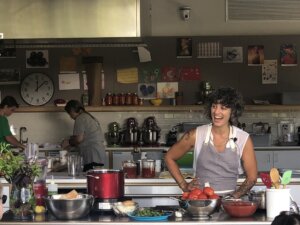
“If ever admitting there is some older or broader origin of [Israeli] cuisine, it’s within this feel-good melting pot kind of narrative,” explained Ora Wise, an Israeli-born New York-based activist chef.
The daughter of a rabbi, Wise, who was profiled in the Forward earlier this year, argues that food is more than a conduit of identity and culture; it is at the center of the conflict. “Israel’s occupation infrastructure has been very deliberately designed to destroy and control Palestinians’ access to their crops, to their olive tree orchards, to their livestock, and also to their water sources,” she said.
In October, Wise and other food industry professionals created Hospitality-for-Humanity. The group urges chefs and farmers to not buy Israeli products or participate in cultural events that promote Israel. The boycott does not target local restaurants or shops that serve Israeli food, which some critics argue could bleed into antisemitism. Still, Wise told me over Zoom that labeling Arab food Israeli is dehumanizing. “I cannot comfortably sit in one of these establishments and enjoy the repackaged ingredients and flavors of Palestine and other Arab cultures,” she said.
In kitchens, cultural appropriation is a constant
In 2013, after Baron opened her café, Silvana, a representative of a group of concerned west Harlem residents presented her with a letter asking that the menu items “Israeli Salad” and “Israeli breakfast” be renamed “Palestinian.” Baron, who owns three other Harlem restaurants and bars with her husband, Abdel Ouedraogo, who is Muslim and from Burkina Faso, explained that these foods are shared across the region, with each country offering slight variations. As is the case with Zeideia, her identity is tied to the food. “This salad represents what I grew up on,” said Baron, whose family has lived in Israel for seven generations.
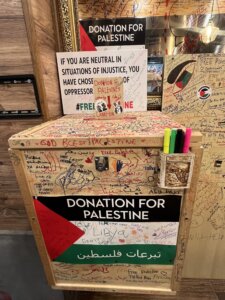
Baron and Ouedraogo hosted the group of 20 at their restaurant, Yatenga, and viewed a PowerPoint presentation by the group leader. The couple decided against changing the menu, arguing that cultural appropriation is a constant in kitchens. “We were sitting in Yatenga, a French bistro with a Mexican chef. The name is a Burkina Faso province,” she said, “But no one cared about that.”
Silvana’s decorations and the crafts it sells are eclectic, with a large African influence. Aside from these two menu items, it’s not obvious it’s an Israeli cafe. Still, Baron worries that her business could be targeted like Tamar Juice Bar in Bed Stuy, Brooklyn, which neighbors boycotted for being Israeli-owned and serving Middle Eastern-themed drinks.
She hasn’t put up an Israeli flag. She said doing so would be “triggering,” which seems to be the case at Caffe Aronne, an Upper East Side cafe where some baristas quit, saying that the Israeli flags and hostage posters politicized their workplace, creating uncomfortable and even volatile interactions with customers.
The Israeli celebrity chef Eyal Shani owns several restaurants in Manhattan. The Miznon chain and the newly opened kosher restaurant Malka are branded Israeli and have donated proceeds to Israeli causes since Oct. 7. At Port Said, his Greenwich Village club and restaurant, he hasn’t done any fundraising. A server explained that many customers don’t realize the restaurant, named for an Egyptian city, is Israeli-owned.
While the Lebanese-owned chain Naya identifies as “Middle Eastern” and Israeli chef Lior Lev Sercarz describes his East Village shawarma restaurant Spice Brothers as “Eastern Mediterranean,” Palestinian restaurants tend to be more upfront. Ayat, with locations in Brooklyn and Manhattan, decorates their restaurants with political murals. Their menu includes the controversial slogan “From the River to Sea.” After Oct. 7, their newest location in the East Village was flooded with one-star reviews. It’s not the first time Ayat was harassed, but it was packed during a recent weekday lunch.
Zeideia doesn’t fear that the King of Falafel and Shawarma will be targeted for his politics, although he knows it’s possible. He told me that he’s experienced discrimination ever since he started out driving yellow taxis in the 1980s. Just to be Palestinian has proven to be a controversial political stance, but it’s nothing that he would ever tone down to protect his business. “How can I worry about myself when people are being killed in Gaza?” he asked.









